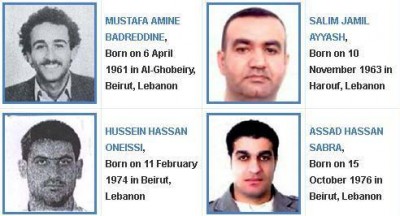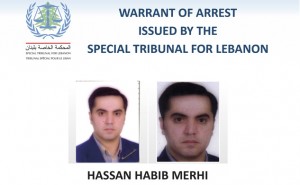The following report by the Lebanese newspaper Daily Star clearly demonstrates how Hezbollah continues to subvert justice and undermine the efforts of the Special Tribunal for Lebanon and the Lebanese authorities in their search for a suspect accused of complicity in the assassination of former Lebanese PM Rafik Hariri.
Hezbollah has denied access to the southern suburbs multiple times to Lebanese investigators assisting the Special Tribunal for Lebanon in their search for a suspect accused of complicity in the Hariri assassination, a document published by the court has revealed.
The document offers unprecedented details into how Lebanese criminal investigators acting under the Prosecutor General were stymied by Hezbollah in their efforts to arrest Hassan Habib Merhi, a party suspect indicted this summer, by being outright denied access to neighborhoods in Beirut.
It also shows that government investigators had to repeatedly ask for permission from Hezbollah before attempting to interview Merhi or even affix a wanted poster at his residence.
The document, which details the STL trial chamber’s decision to try Merhi in absentia, reveals in stark detail the Lebanese government’s powerlessness in carrying out arrest warrants against the Hezbollah suspects, protected in an edict by the party’s leader Sayyed Hassan Nasrallah, who said he would cut off the hand of any who attempt to arrest his party’s cadres.
The STL is tasked with investigating the Valentine’s Day bombing in 2005 that killed former Prime Minister Rafik Hariri and 21 others.
The court has indicted five Hezbollah members in connection with the attack. Trial for four of them – Mustafa Badreddine, Salim Ayyash, Assad Sabra and Hussein Oneissi, is scheduled to begin in absentia in January.
The court decided last week to try Merhi in absentia, after determining that efforts to reach out to him had failed.
Hezbollah’s efforts to undermine Merhi’s arrest are detailed in a section explaining the rationale behind the decision taken.
It describes efforts by the Lebanese Prosecutor General, working with the Central Criminal Investigation Section, in arresting Merhi and informing him of the charges leveled against him by the tribunal.
The first obstacle came up after the indictment against Merhi was confirmed in July. The indictment was sent to the Prosecutor General, who then sent it to the CCIS.
But just three days later, 30 people were killed in a car bomb explosion in Ruwaiss, a neighborhood in the southern suburbs, prompting Hezbollah to barricade all entrances into the area.
“The Acting Prosecutor-General reported that CCIS officers tried to go into Dahyieh several times to look for Mr. Merhi, but that these security measures prevented them from doing so,” the trial chamber said in its decision.
The officers then contacted “the Security Committee of Hezbollah to negotiate access.”
The party denied the request, saying the government could not carry out any tasks related to Merhi in the suburbs or his home village in Nabatieh due to the security situation.
The statement appears to be the first explicit acknowledgement by the court that the party is actively obstructing its work. It also raises questions over Lebanon’s ability to cooperate with the tribunal, particularly since Hezbollah is part of the government.
The admission that the authorities are cooperating with Hezbollah in the investigation is also surprising since the party has disavowed the tribunal, describing it as a Western and Zionist conspiracy to undermine the resistance.
Lebanese investigators were unable to access Merhi’s home in Beirut until Dec. 6, months after his indictment was confirmed and even made public, and when all chances of arrest would have been remote.
After the first attempt’s failure, CCIS officers tried to post a copy of the indictment and arrest warrant against Merhi at his last known residence. They also tried to provide a copy to the mukhtars of Burj al-Barajneh, Haret Hreik, Zoqaq al-Blat and Ain Qana.
None of the mukhtars showed up for a meeting with the officers.
The officers held several meetings with the Hezbollah “Central Security Committee” to allow them to post the indictment at Merhi’s home.
Hezbollah once again denied the officers access.
A party official “told them that they could not go there because Mr. Merhi’s family was very upset that his name had been circulated in the media as an accused in the case of the assassination of Prime Minister Rafik Hariri and his companions,” the trial chamber said.
The trial chamber also revealed that Lebanese investigators coordinated with Hezbollah in an attempt to interview Merhi as a suspect in June 2012, but when they arrived at his apartment in Burj al-Barajneh, he was not present. They visited his home twice after that, but found the apartment empty after knocking on the door and receiving no answer.
The document also provides previously unknown details about Merhi, whose last known residence was an apartment in the Burj al-Barajneh neighborhood in the southern suburbs. He also owns real estate in the village of Ain Qana in Nabatieh.
Merhi obtained passports in 1993 and 2007 and has not officially left Lebanon since returning from a visit to Syria in October 2002.
Merhi is accused of coordinating the preparation of a false claim of responsibility for the Hariri assassination and for helping recruit Abu Adass, a man who appeared in a video claiming responsibility for the attack aired on Al-Jazeera.
Merhi is also one of only three users of the “green network” – telephones allegedly used by the leaders of the assassination team.

Prosecutor Norman Farrell has asked the trial chamber to combine the two cases of Merhi and the other four accused because they are all allegedly part of the same conspiracy.


Leave a Reply
You must be logged in to post a comment.